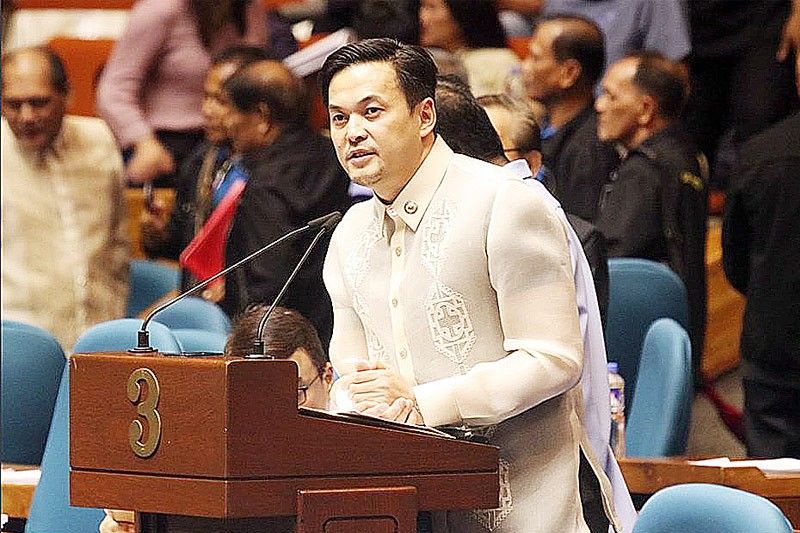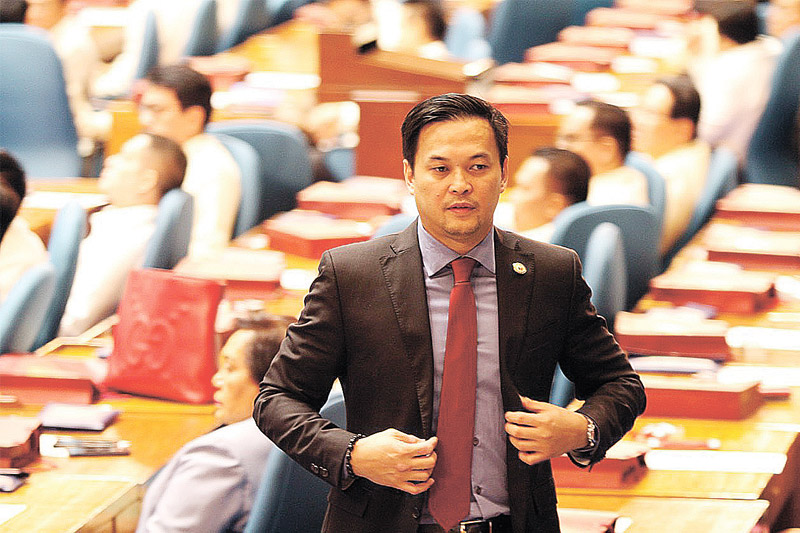Rep. Mikee Romero: The country’s young leader among leaders

MANILA, Philippines — They garnered more votes and had bigger constituencies than their colleagues, but they were looked down on as second-class lawmakers. Although they made up one-fifth of all members, they were regarded as no more than the pesky political interlopers in the elite club called the House of Representatives.
Things drastically changed with the 18th Congress as the party-list representatives organized themselves into a force to be reckoned with, thanks largely to the spirited marshalling of one of the most dynamic and inspiring young leaders to emerge from the party-list system.
Michael L. Romero of 1Pacman party-list, the business-sports leader who forged the varied interests and constituencies of sectoral representatives into one common cause under the banner of one of the biggest and most powerful blocs in the House, would have been automatically eligible for one of the most senior positions in the House leadership. But as the chamber organized itself into a working legislature, Cong. Mikee, as he is more popularly known, refused to accept any of the so-called ‘’spoils’’ of victory until most, if not all, members of the coalition got their important assignments.
In the political world where the leader usually gets first crack at key opositions, this kind of leadership is rare and refreshing.

1Pacman party-list Rep. Mikee Romero, together with his mom Lilibeth Lagman Romero (center) during the oathtaking with Justice Remedios Salazar-Fernando. Photo Release
After holding out for weeks, Cong Mikee obliged his members and accepted the position as one of the chamber’s deputy speakers. Such is the management style that has propelled the 47-year-old Romero to a position of leadership in business and sports, where competition and teamwork exist in harmony to achieve the desired results.
Such ‘’selfless leadership,’’ according to a prominent member of the Party-list Coalition Foundation Inc. (PCFI), was the catalyst that bound the 54-strong coalition into the second biggest political bloc in the House. Not since the 1987 Constitution created the party-list system in the Philippines has such minor parties and marginal sectors gained so much power as a single coalition.
The group’s clout came to the fore when the House elected its Speaker recently. At some point before they elected their leaders, congressmen toyed with the idea of having the Speaker of the House –third in the line of succession to the presidency of the republic – come from the ranks of an increasingly powerful partylist bloc.
Instead of putting up its own candidate for the speakership, the coalition chose to become a king-maker, wooed by a number of candidates from different political parties supportive of President Rodrigo Duterte.

Mikee Romero delivered a privilege speech that called for the total electrification of the country to bring 16 percent of the households of the entire country out of the dark. Photo Release
‘’The party-list coalition’s strength became apparent in the speakership fight and we became the swing vote,’’ recalls Romero. ``We are now a force to be reckoned with in the House and we will no longer be taken for granted.’’Alan Peter Cayetano was elected Speaker of the House and will serve in that post for 15 months, after which Rep. Lord Velasco of Marinduque takes over for the remaining 21 months of the 18th Congress in an agreement, brokered by President Duterte, that averted a divisive squabble among pro-administration parties in the House.
How did Romero, just on his second term as congressman, manage to whip together such a diverse group of congressmen representing diverse and sometimes opposite interests into a major player in the House? Until this year, the party-list groups had been a loose coalition with each member pursuing a different agenda and marching to the beat of its own drum.
“After the last election, I talked to each and everyone of them. With the help of other coalition leaders, I convinced them that `if we want to be relevant, we have to unite and organize,” Romero said.
For his efforts, the party-list reps elected him to be their leader. It’s a very diverse group of legislators and, as one columnist noted, they chose as their leader the richest member of the House and one of the richest Filipinos.

Romero believes that being selfless earns the respect of the people you lead, and that is the key to being a strong leader. Photo Release
“Leadership is not about being rich. Hindi naman porke mayaman, puede na maging leader. I’d like to think they believe in my leadership and that’s why they chose me to lead the coalition, but maybe it’s best to ask members why they elected me”, he said. Maybe it will also help to remember that in the previous Congress, neophyte partylist representatives also elected him as their leader.
Of the 61 party-list members of the House, only the seven members of the militant Makabayan bloc are not with the coalition. ``They have a different agenda, but we collaborate and work together in areas where we have common interest,’’ says Romero.
On his own, Romero immediately went to work at the start of his second term, coming from a record-setting first term with the number of bills and measures filed. Following the death of his step-father, the veteran actor Eddie Garcia, while filming a television series, he filed a bill that seeks to protect movie, television and theater workers and to provide them with safe and healthy working environment. The measure was aptly called the Eddie Garcia bill.
And as part of his poverty alleviation advocacy, he delivered a privilege speech, backed by extensive research, that called for the total electrification of the country to bring 16 percent of the households of the entire country – comprising two million households and 13 million individuals – out of the dark ages. This, he said, involves converting the National Electrification Administration (NEA) into an Authority attached directly to the Office of the President. This, he said, would give the agency the authority and the autonomy to plan and execute the national government’s rural electrification program, which aims for the total electrification of the entire country.
Romero says one of the biggest satisfaction he derives from being a lawmaker is working with the party-list colleagues, who are among the most hard-working members of Congress. ‘’Sila ang pinakamasipag sa Kongreso,’’ Romero says. He also credits them with some of the major legislations in the country, including laws covering senior citizens’ discounts and other privileges, health care, educational reforms and sports development, his pet advocacy being a top sportsman and well-respected sports leader himself.
Rep. Bonito Singson of Probinsyano Ako party-list, hailed Romero’s class act of going “above and beyond the call of duty” as president of the 54-member partylist coalition.
In a message to other coalition members, Singson said: “Congratulations to all of us and with our sincerest appreciation to the very strong, caring, and personal support of our president, Cong. Mikee Romero. We have witnessed and continue to witness his selflessness in making sure that most, if not all of us in the parylist coalition, are taken care of first before himself.”
Romero believes that being selfless is how to earn the respect of the people you lead, and that is the key to being a strong leader. “Step by step, you earn that respect and that reputation. When they see that you are fighting for their cause, it’s not hard for them to say, `That’s our leader.’ Then they follow me as their leader.’’
In the three months following the May elections, Romero worked hard and earned that respect. The hard work produced results for the bloc; three partylist congressmen–Rodante Marcoleta (Sagip), Eduardo Villaueva (Cibac) and Conrad Estrella (Abono) – were elected deputy speakers and the others were picked to key positions. Weeks later, he accepted the same position.
``He is transparent and he has the attitude to care for us,’’ says Rep. Adriano Ebcas (Ako Padayon). ``And he has word of honor. That is why we are so united and solid behind him.’’
Romero did not join Congress without impeccable leadership credentials. Building on an outstanding academic background that saw him earn two doctorate degrees (Business Management and Political Economics) after stints as Professor of Finance in both La Salle and Ateneo graduate schools, Romero took on the family’s business.
Then he built his own business empire, which, by the time he entered politics in 2013, landed him on Forbes Magazine’s list of 50 richest men in the Philippines and on top of the list of richest congressmen in the country. This empire included the Globalport 900 Group, the country’s biggest seaport conglomerate; the holding company Sultan 900; the Manila North Harbour Port Inc.; the Philippines Air Asia Inc. of which he and his wife Sheila Bermudez-Romero are now the single biggest stockholders with 60 percent share. His other business interests are in mining, power generation, real estate and finance.
The Philippines Air Asia, an affiliate of the giant Malaysia-based budget airline Air Asia, is now the fastest growing airline in the country. Romero said the airline hopes to soar to new heights with its ever growing network of domestic and regional destinations and an expanding fleet of aircraft to challenge the dominance of the big boys in the commercial aviation industry. Much like the partylist bloc has stood up to the power of the big boys in Congress.
As an athlete himself, Romero is a natural as a sports leader. Before he was 40, he was already a patron of sports. He headed the national sports associations for cycling and shooting. He founded a professional baseball league. After bankrolling the national basketball team to the championship of the Southeast Asian Games and the Southeast Asian Basketball Association (SEABA) in 2007, the 35-year old Romero was named “Godfather of Philippine Amateur Basketball” by the Philippine Sportswriters Association. He went on to support women’s basketball, and pioneered in new basketball leagues, including the amateur Philippine Basketball League, and the professional Asean Basketball League. He was a founding member of the Samahang Basketball ng Pilipinas, and as team owner of the Globalport Batang Pier franchise, he became chairman of the country’s premier league, the Philippine Basketball Association.
As president of the Philippine National Shooting Association, Romero was the official team leader of the Philippine delegation to the 2012 London Olympics. A potential flag bearer of the Philippine team to the forthcoming SEA Games, he aims to win the gold medal as captain of the national polo team.
It’s not all politics, business and sports for Mikee Romero. He is deeply involved in charity through the 1Pacman Free Medical and Educational Subsidy Program. His Batang Pier Foundation is a regular benefactor of 1,000 Aeta families in Zambales and the Subanen tribes in the Zamboanga provinces and a regular donor of disaster relief, including those for Typhoon Yolanda in Leyte and Marawi siege victims. His wife Sheila’s I Want to Share Foundation regularly helps orphans and cancer-stricken children with fund-raising events like the recent auction of art work, jewelry and other items.
After having achieved a measure of success in business and sports, Romero is determined to make his mark in government, where he intends to etch a lasting legacy of service as a legislator. In this recent privilege speech calling for the electrification of those who have been in the dark, he outlined the heavy responsibility he and his colleagues in Congress are burdened with.
“As legislators,” he said, “we hold a significant amount of power in our hands — that is to create laws that will be enacted by the executive branch. This power that we have, should be wielded responsibly. We should use this power to give power to the ones that need it, and have needed it for a very long time.”
Everywhere Mikee Romero has gone has become a stage to showcase his brand of energetic and selfless leadership – in sports where he was hailed as a godfather at a young age, and in business where his success propelled him to the Forbes list of richest Filipinos. And, now in the much bigger stage of politics and governance, he has been called upon to exercise that leadership. There’s no sign his touch has waned.
- Latest






























